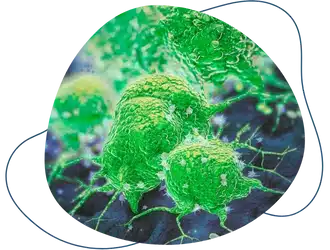“Breath is a bridge connecting life to consciousness”… Unknown
Tick-tock, tick-tock… every breath counts. Lung cancer remains one of the most devastating diseases worldwide, claiming millions of lives each year. Traditional therapies -surgery, chemotherapy, radiation- have advanced, yet challenges such as drug resistance, relapse, and reduced quality of life remain. Today, however, a new frontier is emerging: regenerative medicine and stem cell–based therapies

Beyond Conventional Treatment: A New Era in Cancer Care
Recent scientific discoveries highlight how stem cell technology is reshaping our understanding of lung cancer. Research focuses on two powerful lines of innovation:
- Cell-based therapies and derivatives: Including modified immune cells and stem cell derived exosomes (tiny, naturally occurring particles capable of carrying therapeutic molecules directly to cancer cells)
- Laboratory disease modeling: Using organoids created from induced pluripotent stem cells (iPSCs) -cells created in a laboratory by reprogramming adult specialized cells (skin or blood cells) back into an embryonic like state, allowing them to develop into any type of cell in the body-, researchers can replicate a patient’s tumor in the lab. This makes it possible to test different drugs safely before selecting the most effective treatment for that individual

What is most exciting is that these innovations are not just theories, they are already being explored in early clinical trials and advanced laboratories worldwide
How Stem Cells Could Transform Lung Cancer Treatment
Stem cell based approaches unlock mechanisms that go far beyond conventional medicine:
- Immune modulation: Helping the body’s defenses fight tumors while minimizing harmful inflammation
- Smart drug delivery: Using exosomes as “natural couriers” to transport drugs or RNA therapies directly to cancer cells
- Personalized models: Organoids -self-organized, miniaturized, 3D tissue cultures derived from stem cells that mimic the structure and function of human organs- grown from a patient’s own cells allow doctors to test therapies in advance, reducing trial and error and bringing precision to treatment plans
Together, these strategies hold the potential to make existing treatments more effective, lower the risk of drug resistance, and provide safer, more targeted options for patients
Addressing the Challenges Honestly
Of course, science must be transparent: stem cell therapies are not a magic bullet. Some early studies show that mesenchymal stem cells (MSCs), depending on their source and dosage, may even encourage tumor growth. This is why safety remains a top priority. Researchers are continuously refining techniques to make these therapies more secure, moving toward cell-derived products such as exosomes, which offer benefits without the risks associated with whole-cell treatments
Why This Matters for Patients Today
While no MSC- or iPSC-based therapy has yet been officially approved to prevent or cure lung cancer, progress is moving rapidly. Exosomes are being studied both as early diagnostic markers and as potential therapeutic tools. At the same time, strategies aimed at targeting cancer stem cells are under development to reduce relapse rates.
For patients and families facing lung cancer, this means more options on the horizon, options that are more precise, less toxic and more aligned with the body’s natural healing mechanisms. Regenerative medicine is not here to replace current therapies but to enhance them, creating new hope where conventional treatments may fall short
The Bridge of Translational Medicine: Turning Discoveries into Real Solutions
One of the most powerful forces accelerating these advances is translational medicine. Often described as the “bench-to-bedside” approach, translational medicine ensures that promising discoveries made in the laboratory are transformed into effective, safe, and accessible treatments for patients. It creates a bridge between scientists who explore fundamental mechanisms of disease and the clinicians who care for people every day.
In the context of lung cancer, translational medicine means that breakthroughs in stem cell biology, exosome research, or organoid modeling do not remain as abstract concepts in academic journals. Instead, they move step by step through carefully designed preclinical studies, clinical trials, and ultimately into hospitals where patients can directly benefit. This process reduces the gap between innovation and real-world application, making therapies more relevant, timely, and patient-centered.
Equally important, translational medicine promotes collaboration across disciplines, from molecular biologists and bioengineers to oncologists and patient advocates. This ecosystem accelerates not only the development of treatments but also their adaptation to each patient’s unique biology, ensuring that innovation is both scientifically rigorous and deeply human in its purpose.
By weaving together discovery, safety, and clinical impact, translational medicine transforms the promise of regenerative approaches into tangible hope. It is the guiding principle that ensures that every experiment in the lab brings us one step closer to breathing easier in the fight against lung cancer
The Call to Action
The clock is ticking, and every breath matters. Staying informed about regenerative medicine is not just for scientists, it is for patients, caregivers, and advocates who want to be part of the next chapter in cancer care.
Regenerative medicine is not about replacing existing treatments, but about enhancing them, personalizing them, and opening new doors where few existed before.
The future of lung cancer therapy may well lie in the tiny vesicles secreted by stem cells, in the laboratory-grown organoids that mirror each patient’s tumor, and in the reprogrammed immune cells that can finally tip the balance in favor of life.
This is not just science, it is a movement toward giving patients time, breath, and hope!
Bibliography
- Küstermann, C., Narbute, K., Movčana, V., Parfejevs, V., Rūmnieks, F., Kauķis, P., Priedols, M., Mikilps-Mikgelbs, R., Mihailova, M., Andersone, S., Dzalbs, A., Bajo-Santos, C., Krams, A., & Abols, A. (2024). iPSC-derived lung and lung cancer organoid model to evaluate cisplatin encapsulated autologous iPSC-derived mesenchymal stromal cell-isolated extracellular vesicles. Stem Cell Research & Therapy, 15, Article 246. https://doi.org/10.1186/s13287-024-03862-6
- Lv, L., Chen, W., Chen, N., & Cui, E. (2023). Advances of cell therapy in lung cancer: A narrative review. Journal of Thoracic Disease, 15(12), 7050-7062. https://doi.org/10.21037/jtd-23-1015
- Orooji, N., Fadaee, M., Kazemi, T., & Yousefi, B. (2024). Exosome therapeutics for non-small cell lung cancer tumorigenesis. Cancer Cell International, 24, Article 360. https://doi.org/10.1186/s12935-024-03544-6
- Liu, L., Li, D., Zhuo, A., Wang, J., Liu, J., Yang, X., Zhang, Y., & et al. (2025). A LncRNA panel within EpCAM-specific exosomes for noninvasive early diagnosing non-small cell lung cancer. Respiratory Research, 26, 144. https://doi.org/10.1186/s12931-025-03220-x
- Zhang, X., Huang, Y., Wu, Q., & Chen, H. (2023). Inhalable CAR-T cell-derived exosomes as paclitaxel carriers for treating lung cancer. Journal of Translational Medicine, 21, Article 383. https://doi.org/10.1186/s12967-023-04206-3
- Hangel, N. (2024). Understanding translational medicine: Benefits and considerations. Allied Journal of Medical Research, 8(4), 245. Retrieved from https://www.alliedacademies.org/articles/understanding-translational-medicine-benefits-and-considerations-29743.html
- Acharjee, A. (2023). Translational research and key aspects to make it successful. Translational Medicine Communications, 8, https://doi.org/10.1186/s41231-023-00153-9
- Boccellino, M. (2023). Advances in molecular and translational medicine. International Journal of Molecular Sciences, 24(9), 7726. https://doi.org/10.3390/ijms24097726
- Journal of Translational Medicine. (2023). New insights into the biology and development of lung cancer in never smokers—implications for early detection and treatment. Journal of Translational Medicine, 21, https://doi.org/10.1186/s12967-023-04430-x
- Carini, C., & Seyhan, A. A. (2024). Tribulations and future opportunities for artificial intelligence in precision medicine. Journal of Translational Medicine, 22, https://doi.org/10.1186/s12967-024-05067-0
Ready to learn more about stem cell therapy?

At Stemwell, our team of doctors are highly skilled in successfully supporting thousands of people with a range of stem cell treatments. If you would like to learn more about stem cell therapy you can contact us with any questions, or apply today to check your eligibility.

